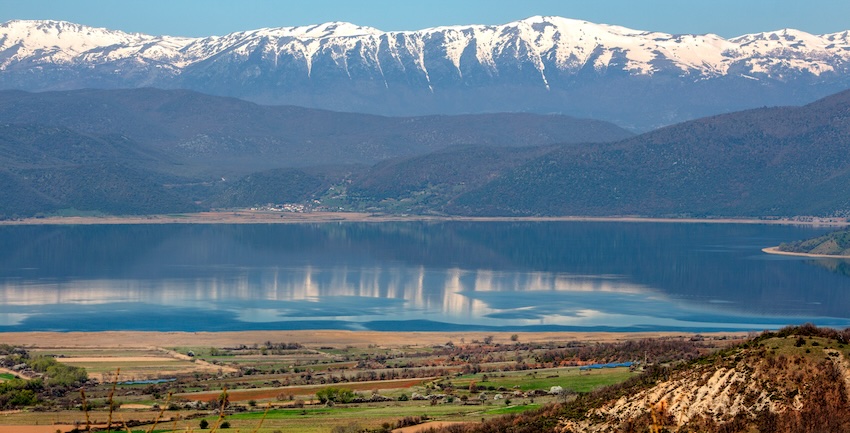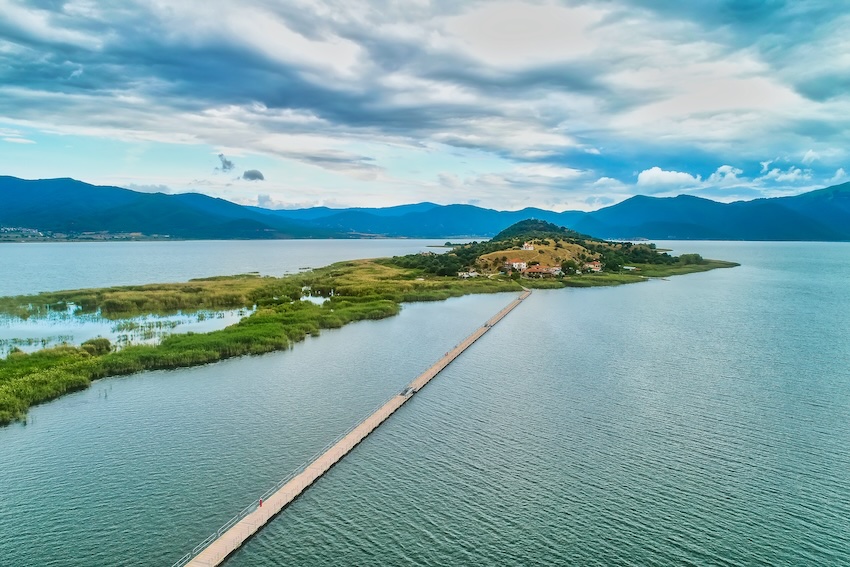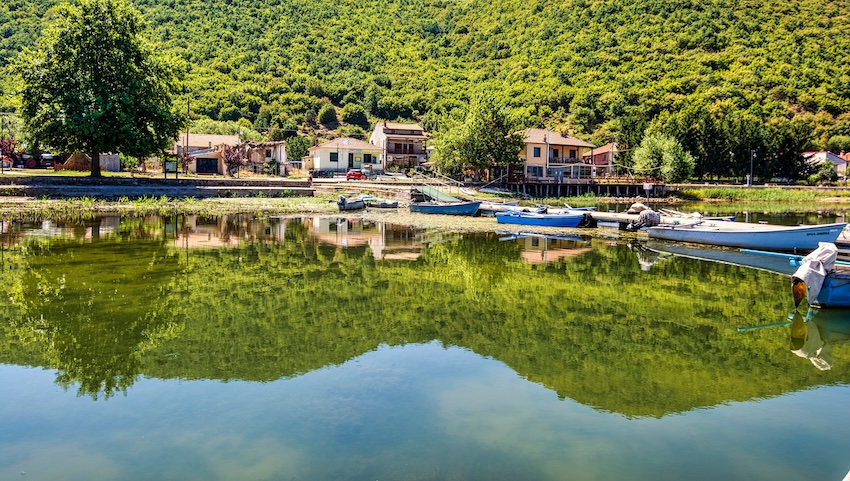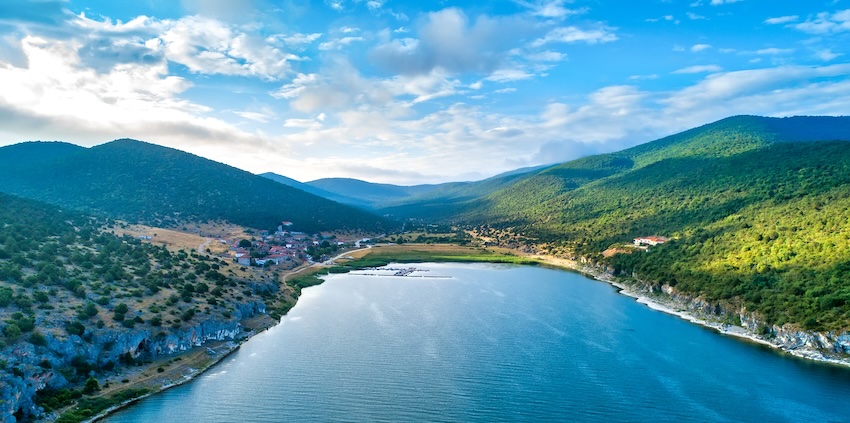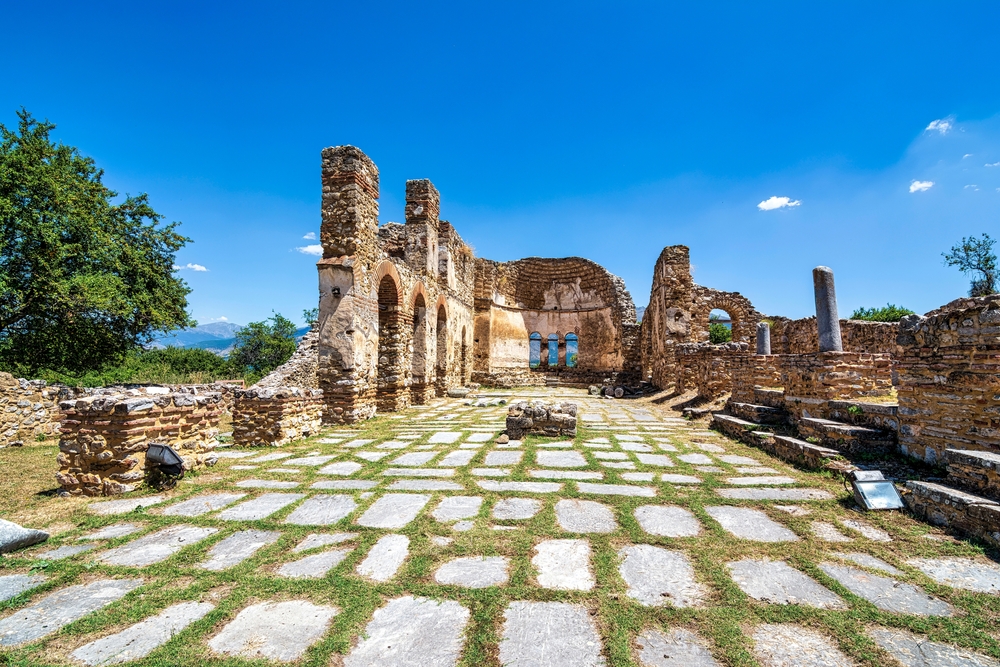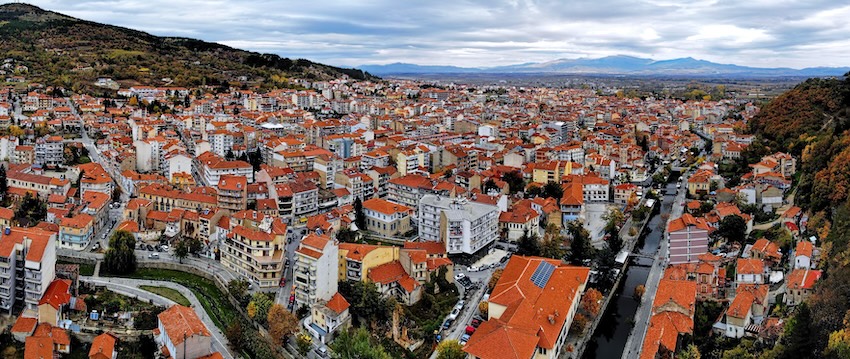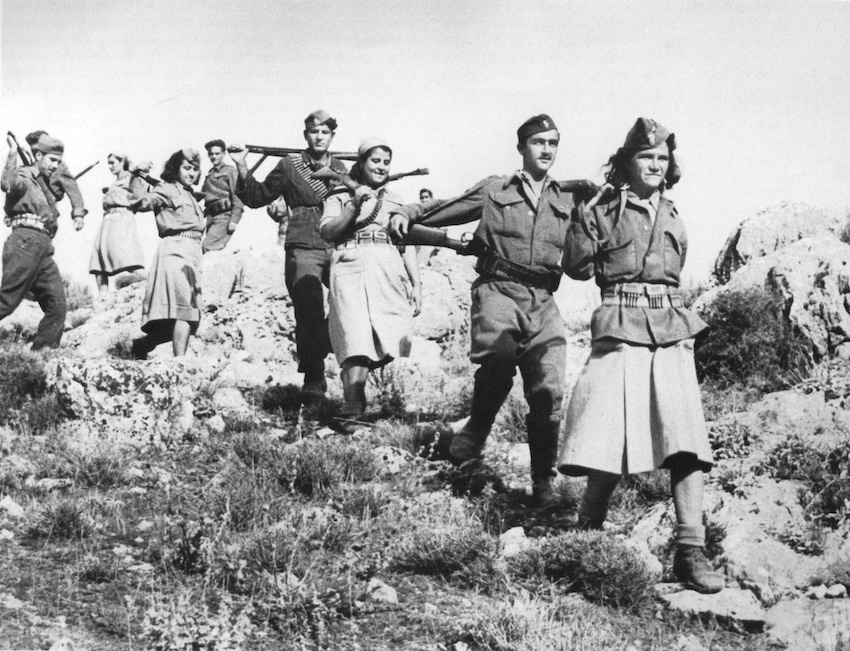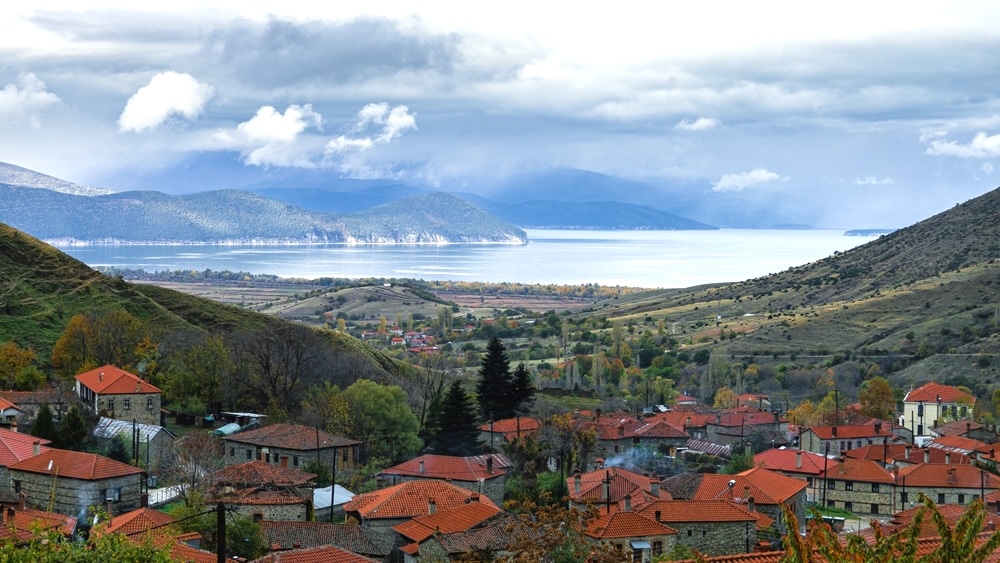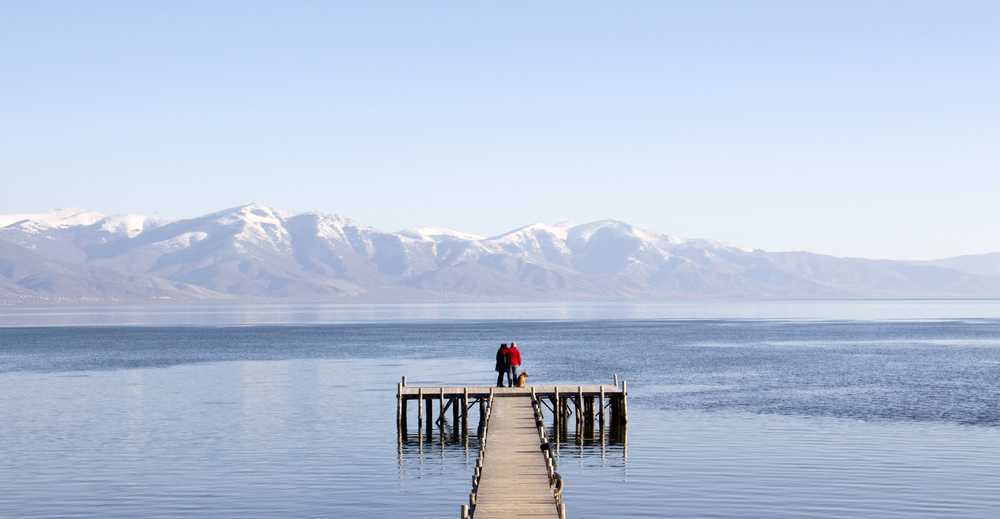
Prespes Lakes
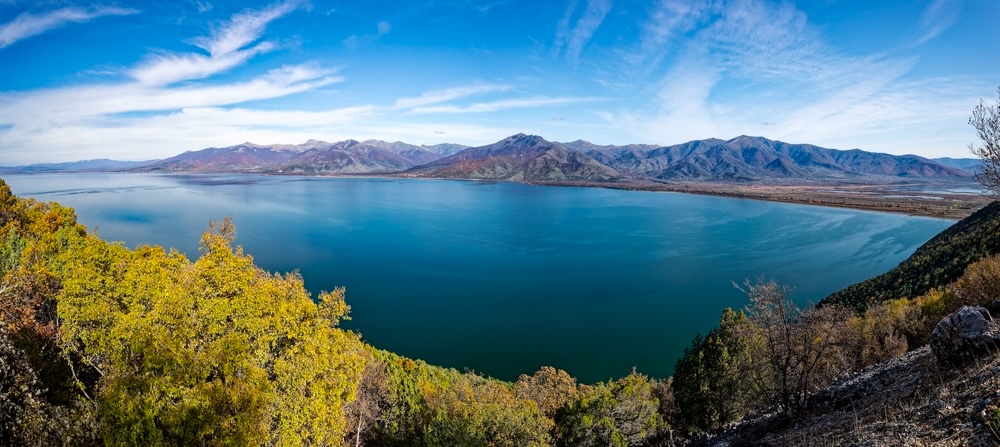
| By Maria Verivaki |
|
Having previously traveled through northeast Greece which borders Bulgaria and Turkey, where there is still enough tension with the latter to require a steel fence border, we were now traveling along Albania and North Macedonia, where borders are more of a formality required by officialdom. Driving through the northern parts of the country, we reached Florina, a Greek city that was known as Lerin a century ago, when the Greek state began the Hellenization of the place names of its newly-acquired territories. You hear a lot about Florina in winter: with an average elevation of 1000m asl, it’s the first part of the country to see snow. Florina is a great place to base yourself for driving choices in the north; apart from its location near the country’s borders, it has ski fields, it’s close to bear and wolf sanctuaries, and perhaps its most scenic views are the Prespes lakes. But sadness prevails; the area is sparsely populated which adds a touch of gloom to the serenity; there are many deserted villages that cannot be revived in any way, despite the region being of immense historical interest. This emptiness can be illustrated by a story told to me by a friend from Florina. While he was driving through one of those villages, he came across its sole occupant, a very old woman, who was sitting outside her house. Hey Babo, how are you? I’m fine, son. Do you have any children, Babo? Yes, I do, and many grandchildren. Where are your children, Babo? Oh, they are everywhere, Athens, Larissa, America, Canada. I also have a son who is ‘mesa’. Once upon a time, the other side of the border was known as μέσα (ME-sa), which means ‘inside’ in Greek. Inside is usually a place that invokes feelings of being ‘happy’, feeling ‘safe’, at ‘home’. It may also mean you weren’t at war, and you weren’t hungry. Why this old woman didn’t leave to join her children is anyone’s guess. Maybe she had created her own ‘mesa’ without crossing any borders. Having previously traveled through northeast Greece which borders Bulgaria and Turkey, where there is still enough tension with the latter to require a steel fence border, we were now traveling along Albania and North Macedonia, where borders are more of a formality required by officialdom. |
|
|
|
Little Prespa is in Greek territory, save a small tail end which is part of Albania. The triborder is located somewhere in Big Prespa. The Prespes region is famous in modern times as being the location of the famous (dis)agreement of 2018 between Greece and the then Former Yugoslavian Republic of Macedonia, resolving a “name dispute” between the two countries" (according to Wikipedia). It's where North Macedonia got its international name from but what people call their country in their own country has no relation to any agreement. The name dispute still comes up in the politics of both sides. It is difficult to resolve because neither side is willing to give in. Would the countries ever go to war over it? North Macedonia has a professional army without conscripts; Greece needs the military to solve other border issues. At what seemed like a major crossroad, we stopped to read the memorial which commemorated fallen soldiers at the battle of Vitsi. Wikipedia will tell you that it was "the final campaign launched by the National Army of the internationally recognized Greek government against the communist forces during the Greek Civil War" with about 1500 fatalities. Wherever you go up here, you will come across war memorials. But they don’t always tell the whole story. Most of those memorials are dedicated to “one” side, usually those fighting with the Greek National Army, not those who were on Greek territory with the ‘Democratic Army of Greece’ (DSE) – the army fighting for communism. The Prespes lake region is well known for its bean cultivation. Beans grown in West Macedonia are big business, distributed all over Greece and regarded as the tastiest. During the period that we were traveling, the beans had already been harvested and the plants were looking very dry and brown. Before the Prespes lakes came into view, we saw the first bean sellers. A man and a woman were both standing outside their vans which they had parked on the shoulder of the road. The vans were open, so that potential customers could see their wares. They were obviously competing against each other, but it was clear that they were friends. We stopped to buy some, even though we knew that we would encounter more bean sellers in our path. We would buy from the others too: it's a way to spread the love (give money to everyone). I spoke with the woman about how she cooks each bean variety, while my husband talked with the man about the drought Greece was experiencing and how this has affected cultivations. He told us that even if there is enough water to irrigate the bean plants, the beanstalks start to go dry and get burnt at the top due to the extreme heat which then ruins the plants. He also told us about the wildlife in the region, which is being affected by climate change. Wolves are now entering inhabited regions, killing domesticated animals, including pet dogs. While bears don't cause damage, when they roam away from their natural habitat which is the dense forest, they come into people's gardens and mess them up. There was an anti-bear garbage disposal unit next to the man's van which we found amusing. We thanked them both for the information they shared with us and carried on our way). |
|
|
|
The Prespes region invokes awe. The breath-taking view on the first sighting of Little Prespa cannot leave you unmoved. The peace and quiet hits you immediately; it will remind you that this peace should not be broken. The Prespes region is as remote as it gets; to reside here, you are living on the edge of the world - the Greek world, that is - the last frontier. As you pass the bean plantations, the concept of heroism cannot escape your mind. The used reeds are piled up after the harvest which reminds us of how precious resources are here. Our first stop was the village of Mikrolimni. Mikrolimini is described by just two sentences in its Greek Wikipedia entry: the name it went by before 1923 (it was called Lanka), and the number of inhabitants. In the English Wikipedia entry, it has a third sentence about the origin of the inhabitants. In its Bulgarian entry, you will find out that “In the 19th century, Lungi was a purely Bulgarian village”; in its Macedonian language entry, you read “In the 19th century, it was noted that Lanka was a purely Macedonian village”. Reding between the lines, it’s easy to understand what happened to the village every time the borders changed. |
|
|
|
The lakes obviously spilled into each other at some point in the past. That strip of land separating the lakes is now known as Koula. The internet is full of information about the area but only as a nature spot; little mention is made about the prominent military position it once held when Yugoslavia still existed. It was under police control as a checkpoint to ensure that the 'right' people were entering and leaving the area; this ceased some time in the mid-1970s. It is only to be expected that this point is also associated with war memorials and deaths. We drove by a few closed restaurants in the region; it was the in-between season and these places operate when there a lot of visitors in the area, e.g. holidays and weekends, weather permitting. But most visitors and day-trippers are more likely to go to the sole restaurant on the tiny island of Agios Achillios (it has always been known as St Achilles) in Little Prespa. It was a beautiful sunny windless day when we visited. We walked over the floating bridge connecting Agios Achillios island to the mainland, taking in the amazing views. The ruins of the Byzantine church that the island is named after are simply breathtaking. At the entrance to the floating bridge, you will also come across more bean sellers. There must have been about a dozen or so. I bought more beans from three different sellers. The youngest of the sellers, a woman, thanked me, expressing her annoyance that the older sellers would hog positions from the previous evening right by the exit to the bridge. If you noticed what everyone was selling, it was all the same stuff. The most expensive variety were the gigantes (giant beans). |
|
|
|
The other most popular place in the Prespes region is the village of Psarades, which means ‘fishermen’ in Greek. That was the name chosen for this village which used to be known as Nivitsi). Wikipedia will give you different information about the village according to the language you choose to be informed in. Psarades is where boatmen ply their trade by conducting tours in the part of Big Prespa that belongs to Greece. On our arrival – basically as soon as we got out of our car - a man approached us asking if we would like to go on a boat ride. We declined at that point because we wanted to take in the views. When we were ready for the boat ride, we realised that the different boats and the experience of the boatmen played a big role as to where they would take you. There’s a strip of land leading to the coast which is full of restaurants, with the most popular being, no surprise, at the end of the road with a view to the lake. Not much else was busy apart from that one. There is also a floating bridge to get you to the lake area but you couldn’t enter it from its start point - drought has lowered the lake's boundaries to the point that the bridge can no longer float. Getting closer to the shore's edge, we watched people getting onto what looked like a modern boat and we got there just in time to join it with another 8 people (maximum passengers: 10). It wasn't the warmest of days and the wind was quite strong as we sailed on the lake. But the boatie was young and seemed very knowledgeable about his area: What happens if you go into other countries' territory, a man asked. Nothing, said the boatie. We have nothing to divide us here. Do the others come into our territory? No, we're more likely to enter theirs. We use this part of the lake more than they do. And what do they do if they see you enter? Nothing, just like I told you before, we have nothing to fight over. Don’t listen to the news! They only tell you half the truth! |
|
|
|
We took the short boat trip in Big Prespa – where the triborder of Albania, Greece and North Macedonia is located. The rocky precipice with Greek territory is painted with icons on the rocks, and one of the churches (originally an ascetic’s hermitage, dedicated to the Metamorphosis of Christ) is no longer accessible Along the way, he pointed out to us the 14th century saints’ icons painted straight on the rockface, which were drawn before the fall of Constantinople. This is obviously a signal of what belonged to who throughout history. He also pointed to a church built in the rock that was last used for a sermon on its feast day in the early 1980s; the church and the state couldn't agree about what to do with it, so they left it to its own fate. And then, he pointed to a cave, where he told us we would have a short stopover. We disembarked and walked over the rocky coastline, making our way to the ladder that we would climb to get inside the cave. There, our eyes met a magnificent sight: a church had been built in it, whose walls were covered in iconography from head to toe. The view of Big Prespa from the cave itself felt majestic. The 45-minutes trip opened up our appetite, as we say in Greek. We headed back to the restaurant by the lake where we ordered the local specialties: fried carp, bean soup and leek pie, before making our way to our hotel. |
|
|
|
Florina is just 20 minutes from the border with North Macedonia. Florina boasts that it is the city where Greece begins, the city where the famous film maker Theodoros Aggelopoulos made The Suspended Step of the Stork, which explores the relationship between people and borders. But it has lost much of its population due to multiple crises, first and foremost related to being a Balkan border town. Like its neighbour Kastoria with the fur trade, Florina slowly being phased out in Greece; cow's milk is now collected by quota, so that a producer's excess milk production is no longer bought; the milk crisis was exacerbated by the introduction of 7-day milk: milk now has a longer shelf-life and cows didn't need daily milking. The loss of the industries led to job losses which have not been replaced. And with job losses come the loss of people. Florina is now a city where more people die than are being born. The history of the Greek civil war is not always easy to unravel. While it is no longer taboo to talk about it, it is not always easy to find unbiased information. But its taboo nature lasted until as recently as the beginning of the 21st century. We can all agree that some people willingly took part in the uprising against the national government, but others were probably coerced by threats against their family, among other reasons, and were forced to fight for the ‘other’ side. No war is fought fairly. The brunt of the troubles took place in the northern part of the country but the civil war did not start there: the ideology was already in existence all over the country. The reason why much of the fighting took place in the north is obvious: the communists were slowly being defeated, and they were eventually being forced towards the borders where they could escape to the communist countries to seek refuge. A few of the now unused schoolhouses in the affected villages of northwestern Greece have been turned into museums, with the agreement of the villagers themselves, by voting for their establishment in a sort of referendum. These museums are really photographic exhibitions supplemented by a meagre number of artifacts; most items did not survive over the years, purged by the other side, although they may still exist beyond the Greek borders where many of the communist sympathisers escaped to. We had tried to visit one such museum near the village of Aetomilitsa (formerly Denisko) in Ipiros, but couldn't find a contact to open it for us. This time, I phoned the contact number given in the google entry for the EAM-ELAS-DSE museum located between Prespes and Florina, in the village of Kalithea (formerly Roudari). A man answered and told us to ask for the key at the grocery next to the museum. |
|
|
|
The EAM-ELAS-DSE museum is located in a quiet pretty village set against the Vitsi mountain. We drove by many guesthouses which were closed because the ski season had not started and … there was little to do there. Just one cafe was open at the Vigla ski field near the village of Pisoderi, which has the (dis)honour of a 'Monument Against the Prespas Agreement', signed by those who erected it, some of whom live abroad while others remain anonymous. Not a door or window was open in any of the buildings, most of which had been turned into guesthouses. Yet just a few days ago, the place was booked out over the three-day OXI weekend. Guards are employed to watch over the area. We found the museum easily with the use of the GPS. If we had relied on street signs, we would not have found it. Some of the monuments and memorials dedicated to the communist side of the fighting are not signposted. While they are relatively newly developed sites, showcasing the subject is still not the norm. The man at the grocery who opened the museum for us mentioned that older people in particular don't understand why anyone would want to come to see a place like this: 'to learn about our misery', as they say. The Greek state has probably silently agreed to the KKE's (communist party of Greece) requests to set up information centres of this kind, even though it may also see them as a form of indoctrination in terms of the messages they spread, when such places are set up in former schools. The wounds are no longer raw and they have mostly healed, but suspicion never dies out completely: Kallithea was once a Slavophone village. Before entering the museum, the grocery owner showed us around the yard where the names of the fallen were written on plain plaques. He pointed to his own family's names, explaining the prejudices of the state that affected his family's status in the region: “The state regarded us as Slavs. But we weren't Slavs. We were Vlachs. I speak Greek but my ancestors didn’t Greek. We spoke our own language which is now dying out here because we learnt only Greek at school. My grandfather was a priest. He never spoke Greek. Now, most of my family is based in Monastiri.” We asked where Monastiri was.) “Oh, you will know it as Bitola in North Macedonia. (Bitola = monastery, monastiri in Greek). Most of my nephews and nieces live there, since that's where my uncles and aunts went to escape the civil war. They never spoke Greek. I've lived in Kalithea all my life, but Bitola is not far. I visit my cousins as often as I can. It's cheaper for me to do my shopping across the border. What else can I do, when petrol costs 2.40 here and 1.20 there? Jobs here are not easy to come by, and you need to supplement your pension somehow if it is a low one.” We spent some time looking at the photos and reading the material posted on the walls of the old schoolhouse. Some pictures cannot be described due to the atrocities they depict. It was interesting to see so many photos of women in khaki. The DSE did not discriminate between genders and both were conscripted. Women took an active role in the army, carrying arms, not just doing women's work. Men also sewed uniforms (the DSE had a uniform-making unit in Kallithea, which was one reason why the museum was set up there). The photographs urged silence, as a sign of respect. It makes no difference whose side you are on. When we had taken in as much as we could, we went back to the grocery to let the man know that we were leaving. At that moment, an older woman who had just finished her shopping was leaving the store. The grocery owner told us some of her story: Her mother was a rebel. Her father died fighting. To escape death, her mother crossed the border and went to Bitola. She left her daughter with her mother, the woman's grandmother. Many women were like her grandmother: they were simply waiting for their children to return. Some of them did, but many did not. Olympia's mother never returned to Greece. Instead, her mother found a new partner and had a family with him. Olympia did get to meet her eventually, but she never regarded her as her mother – she had been raised solely by her grandmother - and she never forgave her mother for not returning home. Her grandmother never saw any of her other children again. Olympia had not been baptised when her mother left. A priest came to the village one day and baptised all the children whose parents had crossed the border. He gave them random Greek names. That's how Olympia got her name, randomly. But not all children were left alone on the Greek side of the border. Many of the young children were also taken across the border for safety. The older ones were conscripted. When those children returned home at the end of the war, they found things very difficult here. They had been well looked after; they had all the food they needed and they went to school. By the time they returned, some of them were even very well educated. They all spoke more than one language. They were surprised to find their homelands in a very bad state. Post-war, people were hungry and poor in Greece. Some experienced problems trying to get back to Greece: the communist countries didn't like that they wanted to leave, after having 'invested' so much in their migrants, in terms of both education and ideology. |
|
|
|
If I learnt anything that day, it was that we had been taught a one-sided view of our history. We bid goodbye to the man at the grocery store, from whose window you could see Big Prespa. He told us which other villages we could visit in the area to give us a better understanding of how the region had developed since the war. It was very eye-opening. Our first stop was Laimos, formerly known as Rampi. Laimos in Greek means neck, so I suspect its geography gave it its name. Laimos is a working agricultural village, nothing like its neighbour Agios Germanos with its picturesque scenery, pretty villas and boutique cafes. Agios Germanos was once called Germàn. It was obvious how the Slavic-sounding names were being hellenified. Some places were given new names (often agreed on by the villagers themselves), while others were changed slightly to sound Greek. The village was clearly touristic, and if it had any business on that day, it was thanks to coach tours. Once the coach left, the village emptied in the same way as port towns when a cruise ship departs, waiting for the next bus to arrive. |
|
Our next stop was Antartiko (which means ‘rebel’ in Greek), formerly known as Zelovo. To get there, we drove over a little bridge covered in grass with a stream running below it. The village looked deserted. It had some holiday homes which were well maintained, with colourful flowers growing on the window sills. A charming multi-story guesthouse adorned the main square but it was clearly not in use. Across from it was an old building. The window panes were broken and the door was open. Three pups came out of that door to greet us when we saw them. We fed them some pieces of bread that we had in the car. We had time for one more village before it got too dark. Our final exploration for that day was Akritas, known as Bouf in its better days. Bouf was drastically depopulated. Its Greek name - which means on the edge, very remote - began to be used in 1955, well after the 1920s when Greece's territorial borders were sealed. It wasn’t really the case that the actual borders were being contested; each side knew what belonged to it. It was more a case of building a nation. |
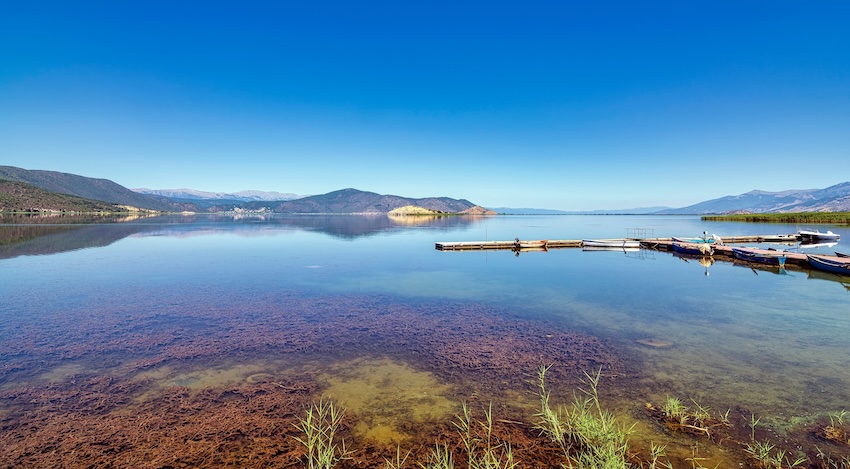 |
|
Greece is regarded as one of the best examples of a modern country which managed to grow by incorporating most of the land that it believed to be its 'natural' boundaries; by 1913, the modern state of Greece had doubled its size through various international agreements, incorporating Crete, Epirus, the Aegean islands and Thrace (it would lose a part of Thrace a decade later), including a large part of a region that has been known since ancient times as 'Macedonia'. Greece secured more than 50% of the southern part, with about 10% going to Bulgaria and about 40% incorporated into Yugoslavia. Bulgaria was never happy about this, which kept Greece on guard against potential uprisings, until as recently as the early 1980s, with checkpoints to keep a close eye on who was crossing the borders throughout the northern part of the country, both east and west (i.e. there were border checks within regions in Greece, not just between the countries that bordered us). After the break-up of Yugoslavia, the 40% that called themselves Macedonian formed a country - the Republic of Macedonia, incorporating irredentist aspects, such as calling themselves the descendants of Alexander the Great (something Yugoslavian Macedonians won’t even remember being taught at school), and raising a flag with the symbol of Vergina on it (associated with Alexander's Macedonia). They had however always called themselves and their language Macedonian and the Greek state knew this - it was one reason why it hellenicised the placenames in its newly acquired territories if they did not sound Greek (which included the whole linguistic range of former Ottoman territories). When Yugoslavia broke up, the cat was out of the bag: this is how the 'name issue' came up. Greece got the southern part of Macedonia, which it had divided into West Macedonia and East Macedonia. Under the leftist Syriza, the Prespa agreement in 2018 was signed by both countries, to accept the name ‘North Macedonia’ for the country that had temporarily been known as the Former Yugoslavian Republic of Macedonia, in this way allowing North Macedonia to enter NATO (it had to accept the agreement in order to be allowed to join). This issue divided both countries to the point that they both hate the name they agreed on. To this day, even though Greece always refers to the country as North Macedonia, Greeks continue to call North Macedonia FYROM or Skopia (from the capital city of North Macedonia, Skopje), while North Macedonia(ns) calls the country (the Republic of) Macedonia. Here's a real-life example: in my international work setting, when North Macedonians visit us, they never refer to their country by name, just saying 'my country', and 'you know my country/the country I come from'. |
|
|
|
Getting back to Akritas - or Bouf - the first thing we noticed as we entered the main square of the village was that our phones sent us a message telling us that we were now on roaming. We hadn't realised how close to the border we were with North Macedonia, just 20 or so minutes away. The square was huge, and the village looked well spread out. There were a few smoking chimneys (the main way we understood if anyone actually lived there), and 2-3 young men could be heard not too far from us speaking Greek. Akritas is 1050 asl, so it was feeling quite nippy, making the emptiness of the region feel even bleaker: some of the houses looked as though they had not been lived in for a long time. But what made the greatest impression on us was a very big building facing the square, whose use we would discover from a sign: it was built to be used as a school, by the residents themselves, with the green light given by the Turks, in 1908-1910, when the region was under Ottoman rule, and the language of instruction was originally Bulgarian, which is similar to Macedonian (both sides can understand each other). That lasted for just two years, after which the language of instruction became Greek. Just like that? You don't start speaking a new language overnight. At one point, 500 children were attending the school; the building stopped being used as a school as recently as 1995. Bouf once had a population of 4,000, but the village now numbers less than 100 people according to the last census. What happened? The northern parts of Greece were all acquired some time in the early 20th century, so it is worth noting that the population decline of northwest Greece is in direct contrast to the relatively stable population rate in northeast Greece: the eastern part was protected by the Treaty of Lausanne after the religion-based population exchange between Turkey and Greece. This protection did not apply to northwest Greece, since the people living in those regions were mainly Christian Orthodox - the same religion as the Greeks. Regarding the language, it became illegal to speak Macedonian. There may have been some truth to the joke about the man who was caught by a policeman speaking to his donkey in Macedonian: he excused himself on account of the fact that his donkey did not speak Greek. The League of Nations demanded that Greece allow Slavophone citizens to maintain their language. Educational material in the Macedonian language was sent by train from the countries where the books were written. But the train caught fire and all the books were burnt… Google sources tell us that the population was nomadic in its origins, so people moved with their flocks to different houses according to the season. Yet, the area had grown so much that the residents themselves decided that a school had to be built for its growing population. But in the 1920s, just a few years after the school began teaching in Greek, most of the people left to go abroad, mainly US, Canada and Australia. What happened during the interim period is probably all related to the way people felt about what was happening in their region: the Greeks were nationalising the country, while the villagers of regions regarded as not-so-Greek felt that they were being ousted. Some call it the Macedonian genocide. You'll get different information according to the language you use to get your information. I came across a recent video on the internet showing a family staying in Akritas a few years ago during the summer. A boy was splashing about in a plastic pool, a woman was washing clothes outdoors in a basin, while man (I presume he was the father) was taking a video of them all. Where are you, the man asked the boy (everyone spoke in American English). I'm in Bouf, the boy answered. And what are you doing, he asked the woman. I'm washing clothes in my new model Electrolux, she said, it's a Bouf-o-lax, and everyone laughed. No doubt, they were descendants of the original residents of Bouf, many of whom visit the region in the summer. No doubt they attend festivals and feastdays organised for the visitors who come from abroad to stay in their homes, reliving their ancestors' lives. They speak Greek – either they never learnt it or it was not passed down to them. They sing and dance to music in their own language. Many people who left during the troubles spoke Greek as well as their own language. But Greek was not the ‘mesa’ language it was the language of the school and officialdom. So when they went abroad, they did not necessarily take Greek with them. They raised their families believing in Alexander’s Macedonia, even though Alexander spoke Greek. We heard Greek being spoken in the village when we were at the main square by its few residents. Our travels in the Greek north have reminded us that borders are fluid. We were free to travel anywhere. The territorial borders are not contested and in essence, we have little to divide us; we share much more than what we believe makes us different. We spoke to enough people to make us understand that however homogeneous we believe we are as a population, we are not all the same kind of Greeks. I have never felt this so much before until I went to the cold quiet north. No wonder Cretans have a hell of a reputation in the rest of the country: we see you come, we see you go, but we are here forever, no matter who thinks he is conquering us. Yes, we are different, but we all communicate in the same language and we can all understand each other - if we want to. |
|
|
|
Maria Verivaki trained as an English teacher in her birth country of New Zealand where her Greek parents emigrated from Crete in the 1960s. She has been living in Greece since 1991 and currently works at the Mediterranean Agronomic Institute of Chania. Her husband Dimitris conducts specialised taxi tours in Western Crete, and they are the owners of Zamboli Apartments tourist accommodation in Chania. |
Help Support Matt's Greece Guides
Do you enjoy using my site? Have you found it entertaining as well as useful? If so please show your appreciation by booking hotels through the travel agencies and the links found on my Hotels of Greece site. The small commission I make on the bookings enable me to keep working and in most cases you won't find them any cheaper by searching elsewhere.
You can find
hotels in Greece by location, price, whether or not it has a swimming pool, and see photos and reviews by using this link to booking.com which also contributes to my website when you book. If you are appreciative of all the free information you get on my websites you can also send
a donation through Paypal or Venmo
Join Matt Barrett's Greece Travel Guides Group on Facebook for comments, photos and other fun stuff. If you enjoy this website please share it with your friends on Facebook and other social media.
